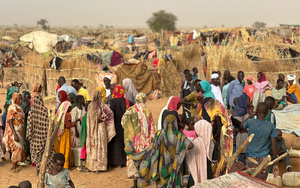
Buried in silence
Cut off from aid and buried beneath war and rain, the people of Jebel Marra – once Sudan’s last refuge – now face a new catastrophe as landslides turn their mountain sanctuary into a mass grave and the world looks away. By Eyad Hisham.

View from India
Nilanjana Bhowmick on the double whammy of natural disaster and Covid-19 that has brought a vulnerable ecosystem to the brink.

Barbudans are resisting disaster capitalists
Ever since Hurricane Irma struck in September 2017, residents of Barbuda have been trying to defend themselves against those who would cash in on their misfortune. Gemma Sou hears what they have to say.

Gone with the wind
Hurricane Maria swept through Dominica, destroying 62 per cent of all dwellings and killing 57, Richard Swift reports.

Anti-gentrification saint
Two artists have invented a saint to protect residents from gentrification. Yohann Koshy reports.

Grief and guilt post-mudslide
In August hundreds died in a landslide in Sierra Leone. Dumbuya Mustapha reports on the arguing over who was responsible that has followed – and the efforts to hold the government responsible to ensure the tragedy is not repeated.

We are going backwards, COP21 is the opposite of progress
Naomi Klein speaks with Frank Barat about the limits of the Paris climate talks.

Wolves and boars galore
Wild animals are benefiting from the absence of humans in the Chernobyl exclusion zone, writes Hazel Healy.

Elusive justice after Bhopal
Thirty years after the disaster, the campaign for justice continues.

Tents beyond tents
A cartoon introduction to life in the camps in and around Port-au-Prince.

Haiti: where did all the money go?
More than $10 billion was raised worldwide for Haiti after the earthquake. But, two years on, what have NGOs done with the cash? Nick Harvey investigates.

Haiti two years on: beyond relief, beyond belief
Haiti is not just recovering from the
earthquake but from the political and
economic interventions of recent decades, as
Phillip Wearne explains.

Who is to blame for the Somali famine?
Is it the US government? Is it Al Shabab? Is it the UN? Sally Healy argues it is the result of a collective failure.

After the floods... A North Frontier village makes a comeback
Merryl Wyn Davies visits a remote village in Northwest Frontier to find out how it is recovering from last year’s devastating floods.

Cyclone survival
Women in Orissa, India, have ways of dealing with calamity













